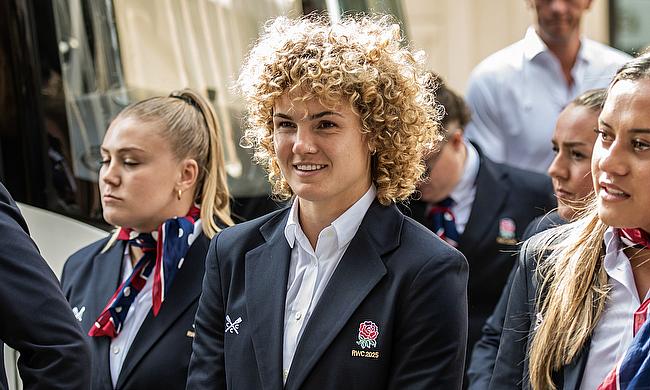Ellie Kildunne Aims to Make the Red Roses as Big as the Lionesses

2024 World Rugby Women’s 15s Player of the Year Ellie Kildunne
©Lizzy Terry/TEZ.PHOTOG
Ellie Kildunne set her sights on more than just lifting the trophy at this year’s Women’s Rugby World Cup.
The England full-back, crowned World Rugby Women’s 15s Player of the Year in 2024, wants to propel the Red Roses into the same cultural spotlight enjoyed by the Lionesses after their European Championship triumph. As the tournament returns to home soil for the first time in over a decade, she sees a unique chance to change how the nation talks about women’s rugby, and how its players are celebrated.
Kildunne recalls the summer of 2022 vividly, when Chloe Kelly’s extra-time winner against Germany in the Euro final became one of English sport’s defining images. Shirts with Kelly’s name appeared outside pubs, on high streets, and in crowded fan zones. That moment, she says, showed what can happen when sport captures not just headlines but hearts. For her, the goal is to see England rugby players, Emily Scarratt, Marlie Packer, Alex Matthews, and herself become names you hear on every street corner, as familiar as Wilkinson, Johnson, or Farrell.
The betting odds for the Red Roses, the England women's rugby team, to win the 2025 Women's Rugby World Cup are quite favourable. Several betting sites UK players can join currently have the Red Roses priced at 4/9, which means they have a 35% winning chance. They are also listed at 1.40, showing they are the clear favourites to retain their title on home soil. For many supporters, checking the odds before a match has become a fun way to measure confidence in the team’s form, whether it’s Kildunne’s try-scoring run, Packer’s tireless leadership, or Scarratt’s composure under pressure. The odds may fluctuate, but the expectation remains high, and this England side is built to win. Those odds aren’t just statistics; they mirror the sense of momentum behind the team, feeding anticipation for each matchday.
That anticipation is set to build quite quickly from the tournament’s opening kick-off. England face the United States in Sunderland before travelling to Cardiff and Exeter for pool matches against Wales and Canada. The final, on 27 September at Twickenham, could draw a record crowd for a women’s rugby fixture if the Red Roses progress as expected. The venue itself has plenty of history for the men’s game. Kildunne wants it to become just as symbolic for the women.
Her case for greater visibility is backed by performance. In 2024 alone, Kildunne scored 14 tries in just nine Tests, a record that secured her the Player of the Year award and cemented her as one of the sport’s most feared attacking threats. That same season, England secured their seventh consecutive Six Nations title, further underlining their dominance. The numbers tell a story of consistency and excellence, but for Kildunne, the aim is for these achievements to translate into cultural recognition.
She’s not alone in that vision. Natasha Hunt, the experienced scrum-half making her return to the World Cup squad after missing the last tournament, has spoken openly about drawing inspiration from the Lionesses’ success. “It showed us what can happen when a team connects with the country in the right way,” Hunt noted in a recent interview. “It’s not just about lifting a trophy; it’s about creating something that lasts.”
Part of that connection will come from making the tournament more visible in everyday life. Kildunne is working with sponsors like Asahi Super Dry on initiatives such as the “Pub Pledge” campaign, which aims to show World Cup matches in nearly 1,000 pubs across the UK. The idea is simple but powerful: fans gathering over a pint to watch the Red Roses, building the same kind of shared moments that football has enjoyed for years. If England’s run goes deep into the knockout rounds, those pubs could become the beating heart of the competition.
The path to glory is never straightforward. While England has lost just one of their last 56 Tests, a narrow defeat to New Zealand in the 2022 final, it will still have to contend with strong opposition. The Black Ferns remain their fiercest rivals, while France, Canada, and Australia all have squads capable of causing an upset. The World Cup format can be unforgiving, and Kildunne is well aware that favourites don’t always finish on top.
The Red Roses’ squad depth is formidable. Captain Marlie Packer leads with a mix of grit and personality, Emily Scarratt brings world-class kicking and game management, and forwards like Alex Matthews and Zoe Aldcroft ensure England’s pack remains one of the most dominant in the sport. Kildunne’s own attacking flair, coupled with her positional intelligence at full-back, gives England a weapon few teams can match.
Yet for all the tactical talk, Kildunne keeps coming back to the bigger picture. She wants to see rugby shirts in shop windows, to hear conversations about women’s rugby in workplaces and cafés, to walk into a pub and find people arguing passionately over who should start at fly-half.
The most important difference now is timing. This World Cup comes at a moment when women’s sport in the UK is enjoying unprecedented visibility. From packed stadiums for football and cricket to televised netball finals, the appetite is there. Hosting the tournament only adds to the opportunity, giving the Red Roses home advantage both on and off the field.
If England go on to win, the rewards could be long-lasting. Increased media coverage, more sponsorship deals, and a new generation of fans could follow. While Kildunne has little interest in the politics of sport, she knows that visibility drives investment. The more people watch, the more the sport grows, and the closer rugby gets to matching football’s national reach.


